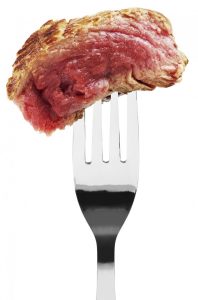Cooking meat provided a huge evolutionary benefit on the plains of Africa for Homo erectus 1.9 million years ago, allowing humans to become the dominant animal on this planet. And now, as billions of people in developing countries are lifted out of poverty, world meat consumption is rising dramatically. In the last half-century, consumption rose from a worldwide average of 23.1 kilograms per person per year to 42.4 kilograms in 2011, an 83 percent increase from 1961 levels. This astronomical increase in the rate of meat consumption is even greater in absolute terms — factoring in the growth of the global population from 3 billion in 1961 to 7 billion in 2011, absolute meat consumption has seen a 435 percent increase!
 The World Health Organization-affiliated International Agency for Research on Cancer (IARC) recently added red and processed meat to its list of known carcinogenic substances. In the medical community, this was hardly news. Many studies have linked colorectal cancer to the consumption of red meat over the past two decades. But how large is the risk? And is an increased cancer risk something to be truly concerned about, or is the media frenzy associated with this announcement simply fearmongering? A review and meta-analysis published in The Lancet Oncology in December 2015 does an excellent job of answering these questions.
The World Health Organization-affiliated International Agency for Research on Cancer (IARC) recently added red and processed meat to its list of known carcinogenic substances. In the medical community, this was hardly news. Many studies have linked colorectal cancer to the consumption of red meat over the past two decades. But how large is the risk? And is an increased cancer risk something to be truly concerned about, or is the media frenzy associated with this announcement simply fearmongering? A review and meta-analysis published in The Lancet Oncology in December 2015 does an excellent job of answering these questions.
In short, the report suggests that consumption of red and processed meat increases the incidence of colorectal cancer by 17 to 18 percent, but this only equates to an absolute increase in lifetime risk from 5 to 6 percent. The mechanism by which these foods increase the risk of colorectal cancer is related to the cooking and processing methods that lead to the generation of known carcinogens. Taking a knowledgeable approach when preparing red meat — primarily by avoiding cured or smoked meat and cooking at lower temperatures — can reduce these risks. However, I have difficulty believing that many Americans will give up their barbecue pastime for such a slight reduction in cancer risk. Besides, there are much greater health dangers associated with a Western diet containing red or processed meat, including atherosclerosis, heart disease and diabetes mellitus.
On top of the human health associations of red meat consumption, farmed cattle release enough methane each year to rival the greenhouse gas emissions from all of the world’s automobiles, and the majority of cows are raised in conditions dramatically less humane than those standard for research animals.
We have the knowledge and tools to change our dietary habits for the betterment of ourselves as well as for our livestock and the environment. Occasional vegetarian days, like Meatless Monday, or a completely vegetarian diet can go a long way toward improving the aforementioned conditions for us and for the rest of humanity. So while I applaud the IARC’s cancer warning, I believe we still need a concerted effort to increase awareness of all pathologies associated with red meat consumption, as well as the environmental impact and oft-ignored cruelty of factory farming.
Related Content
Take Your Diet to the Mediterranean
It’s an easy (and delicious!) change that can turn your diet into a disease-fighting tool. See what’s on the menu—and how to bring it to your kitchen, with the help of a Johns Hopkins expert. Learn more.
Fats and Your Food: Striking a Heart-Smart Balance
You don't need to cut out all fat from your diet to eat in a heart-healthy way. But according to recent thinking, say Johns Hopkins researchers, you do need to know your good fats from the not-so-good kinds. Learn more.
Heart-Healthy Eating on a Budget
You don’t have to spend a lot of money to enjoy meals that are good for your heart. Check out these shopping tips from a Johns Hopkins expert to help you save bigger while eating better. Learn more.
David,
Very well done. I liked the way that you tied together a number of different reasons for considering diet modification. By stating the obvious health benefits along with the environmental impact you are making a good point for both the individual and society. Sorry that I didn't respond sooner. I knew that you sent it but then I skipped over it.
Dad
Comments are closed.